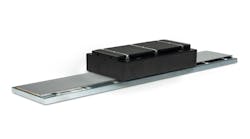I went to a retirement event for a childhood friend who, after 40 years with the same company, made the decision to retire. No big deal, right?
His name is Steve Shepard, and he worked in application engineering for Rockwell Automation in Cambridge Ontario, Canada.
Well, it seems that after 40 years he had gained valuable insight into the processes used, trained many newbies and in the same swoop managed to gain the respect of everyone he worked for and with.
They moved to SAP (painful, to say the least), and to a 3D drafting program along with trying to provide engineering services for a global company providing high-voltage starters and drives.
What I found so moving during the retirement party were the people who talked about him. I mean no disrespect, but I have known this person since I was 13. I would not have described him the same way he was being described. I know people change and grow and mature, but what I was hearing was nothing short of “wow.”
I heard the stories as you would, but the most endearing “wow” was when his former boss took the podium and talked about the innovation that Steve had when designing a 34-ft-wide high-voltage drive system. The problem was they only had 32 ft to work with.
Steve solved the problem by folding a normal, packaged drive cabinet in half and redesigning the cell by making it twice as deep but half as long.
While we don’t know exactly how much of a feat it really was, it is safe to say that this challenge was met with vigor and vim.
It worked, and the customer was very excited that his vision was coming to fruition.
I was so proud of Steve at that moment. See, I was instrumental in getting this job for him back in 1977. I believed in Steve enough to know that he would always do the right thing.
But doing the right thing isn’t necessarily enough for anyone to keep the job they have. In fact, I wonder how many automation jobs are lost because the innovation of which I describe above is actually frowned upon. Keep it simple, and keep it within the confines of our business.
If it doesn’t conform to our standards, then we can’t do the job. So remember my good friend, Gus? He works for a refrigeration company who cookie-cuts projects. And therein lies the rub.
We had a conversation about people whom he would like to hire. He can’t find them, he lamented. It’s hard to find the people they need to do the work.
Well then, I asked, “Why would that be?”
“We make it so easy for them,” he said. “We have templates and designs that all they have to do is click, click, click, and the job is done.”
I simplify, but you get the drift, I hope.
I rolled my eyes because it hit me. We had better be very careful in Automation Land, or we will be worse off in 10 years than we are now. Why?
What hit me is that engineering people want to engineer, and not be bakers. Ask anyone who makes muffins or cakes. The recipe is precise and accurate; both must be met for success.
Gus told me that there are templates to create any project that they have done in the past. So, I asked, all your application engineers have to do is click some boxes and add some code templates and the job is done? While he did say that it really wasn’t that simple, he agreed it was that simple, if that makes sense.
And then he suggested that they have trouble keeping people. Then the big light bulb went off. Of course they wouldn’t want to stay there. They aren’t doing engineering work. In the pursuit of profits, reduced timelines and consistent structure, the engineering has already been done and thus a less qualified person could do the work.
How long does it take an engineer to get bored? A quantitative question which defies a stock answer for sure, but Steve never did get bored because there were enough variations in his work that it kept him engaged for the full 40 years.
With our struggles to create, make and engage new engineers, we must not forget the ones who are already here. Engage them at levels that they are uncomfortable with because that’s what they expected when they went into the profession in the first place.
If we start losing who we have, we might be in worse shape than ever. Congratulations, Steve, for making it all this way. You reached a milestone that most will never enjoy.






